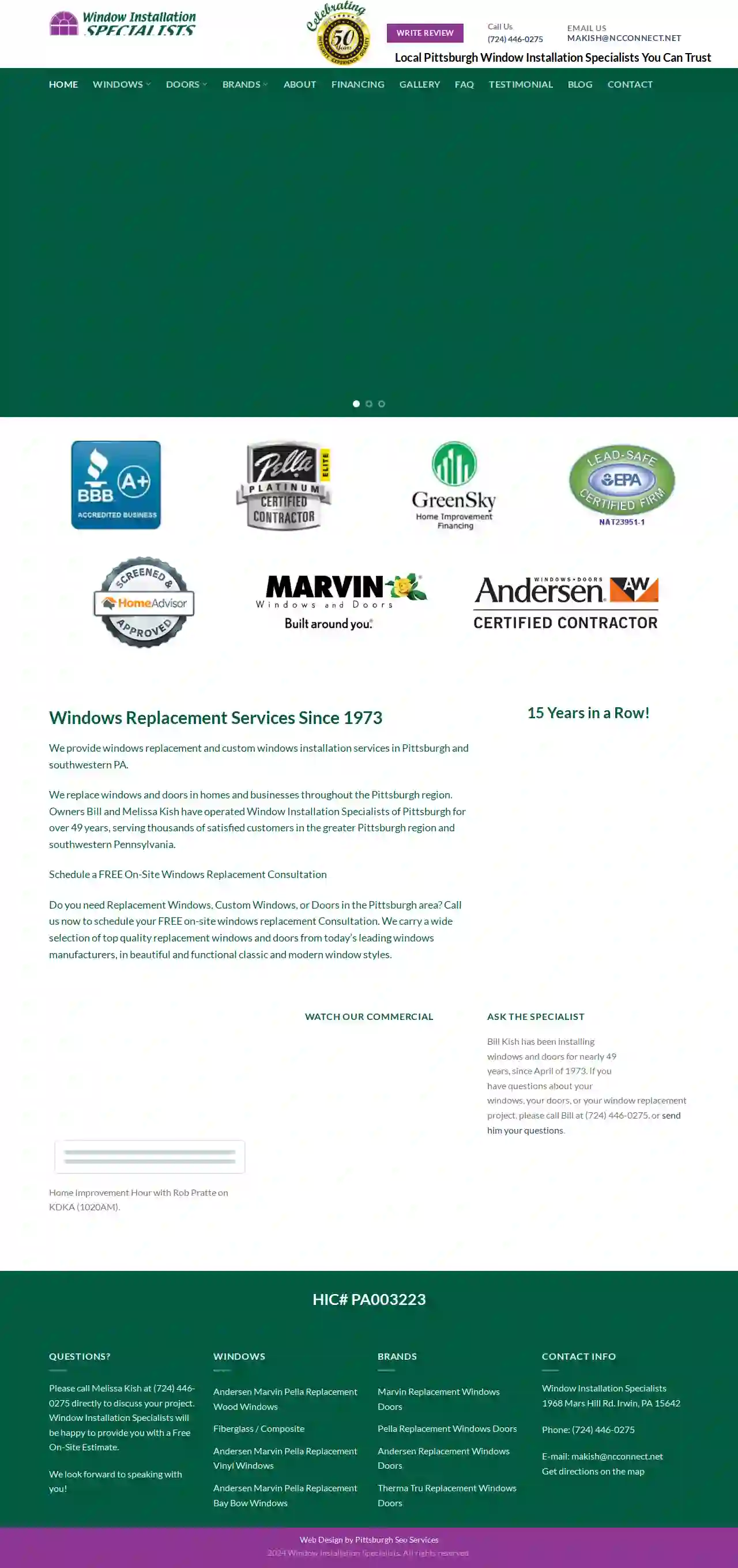Window Cleaning Jim Thorpe
Find the best Window Washing in Jim Thorpe
Receive 3 FREE Window Cleaning quotes for your project today! Compare profiles, reviews, accreditations, portfolio, etc... and choose the best deal.

The Maids in Philadelphia
2.54 reviews310 Ruthar Drive Unit 4, Newark, 19711, USThe Maids is a leading residential cleaning service provider with nearly 200 locations across the U.S. and Canada. We offer personalized cleaning services that fit your budget and lifestyle, making it easy to enjoy a clean and healthy home. Our proprietary 22-Step Cleaning Process ensures a thorough and consistent clean every time. We are committed to providing exceptional customer service and building lasting relationships with our clients.
- Services
- Why Us?
- Testimonials
- Gallery
Get Quote
Windows Pittsburgh
4.935 reviews10000 Forbes Ave, Pittsburgh, PA, 15205, USWelcome to Windows Pittsburgh Serving Suburban Pittsburgh and Western PA since 2004 Pittsburgh's Replacement Window and Door Experts! SCHEDULE YOURFREE CONSULTATION Thank you for visiting our website. If you are shopping for professionally-installed replacement windows and doors you are at the right place. Since our inception in 2004, Windows Pittsburgh’s owners and employees have been dedicated to serving our customers by treating our customers with honesty and respect. We are committed to doing what is right, from the initial estimate to the final install and beyond. We take homeowners through the entire process from start to finish. We understand your home is your biggest investment. Therefore, you can be assured we will never compromise quality in our products or workmanship in order to give you the lowest price. Your investment in quality today will definitely show for many years to come. These are the last windows and doors your home will need.
- Services
- Why Us?
- Gallery
Get Quote
Top Notch Cleaners : Cleaning Services In Philadelphia : After Party Clean Up Service In Philadelphia
4.7159 reviewsPhiladelphia, USAt Top Notch, we believe that your environment has a significant impact on both your physical and mental well-being. Become the best version of yourself by choosing us right now. We offer all types of cleaning services in Philadelphia, New York, New Jersey & Delaware. Top Notch House Cleaners offers comprehensive cleaning services to the people of Philadelphia, New York, New Jersey & Delaware area. With years of experience, our expert cleaning team members can provide top-notch cleaning services. We use state-of-the-art, contemporary cleaning equipment and methods to satisfy your cleaning requirements. You may rely on us if you require expert cleaning services in Philadelphia, New York, New Jersey & Delaware. Our first-rate cleaning services can be tailored to meet your requirements. We have hourly and weekly cleaning rates available. For occasions like parties and festivals, we can pre-clean. Call us if you need any cleaning services.
- Services
- Why Us?
- Accreditations
- Our Team
- Gallery
Get Quote
TY-D Window Cleaning LLC
58 reviews1631 Suburban Ave., Pittsburgh, 15216, USWhy look in when you can SO clearly see out when you choose us for your cleaning needs? Ty-D Window Cleaning, LLC has been providing residential and commercial window cleaning services throughout the Pittsburgh South Since 2001. We also have several crew members who all have been extensively trained to provide you with high quality window cleaning services along with great customer service. We are dedicated to ensuring our customers have peace of mind knowing they are getting the best value for their money. We offer a professional, personalized service to each customer. We appreciate customer feedback, and will resolve any problems immediately. Ty-D Window Cleaning, LLC is fully insured with no contracts to sign. All of our employees have on average the same amount of experience as the owner, Chad. We offer reasonable rates and free estimates, why wait, call today.
- Services
- Why Us?
- Our Team
- Gallery
Get Quote
M.J Window & Gutter Cleaning LLC
541 reviewsPittsburgh, USM.J Window & Gutter Cleaning LLC is Pennsylvania's premier residential/commercial window and gutter cleaning company. We offer an array of home exterior and interior services designed to enhance your properties appearance and curb appeal. Our services save you time and money. Appointments are available 7 days a week.
- Services
- Why Us?
- Gallery
Get Quote
B&B Window Cleaning and Services
3.58 reviewsPittsburgh, USB&B Window Cleaning & Services is a local business that offers exceptional service and customer satisfaction. We believe that the appearance of your home or business is a reflection of you, and we strive to provide the best possible product and service to our customers. Our mission is to be the best in the City of Pittsburgh, and we achieve this by giving our customers the best possible product and service, and giving our employees the time and compensation they need to be happy, successful, and fulfilled. We provide professionally trained, uniformed, and courteous technicians who bring professionalism to the projects we complete and leave your windows with a clean and shine that exceeds your expectations.
- Services
- Why Us?
- Testimonials
- Gallery
Get Quote
Fish Window Cleaning
4.858 reviews301 York Road Suite 106, Warminster, 18974, USWelcome to Fish Window Cleaning! We provide professional window cleaning for your home or business! We are your local window cleaning company serving New Hope, Ambler, Newtown, Doylestown, Richboro, Huntingdon Valley, Willow Grove, Warminster, Langhorne, Bensalem, Chalfont, Hatboro, Feasterville, Jenkintown, Horsham, Dresher, Abington, and Spring House. Call us today for a free on-site estimate: (215) 443-8500. We offer a wide range of services to keep your home looking clean and beautiful! We can clean all of your windows inside and out, make your chandelier sparkle, remove all debris from your gutters, and even clean your ceiling fans, mirrors, and more! We are professional, uniformed, and respectful of your home. We wear clean shoe covers and use cloth pads under your windows to protect your carpet and wood floors. We use environmentally-friendly cleaning products so you and your family won't have to deal with harsh fumes. We even introduce our workers to your home before we start cleaning, so you can meet them and feel comfortable with the service.
- Services
- Why Us?
- Accreditations
- Our Team
- Gallery
Get Quote
Window Installation Specialists
4.465 reviews1968 Mars Hill Rd., Irwin, 15642, USWindow Installation Specialists is a locally owned and operated business serving the Pittsburgh area. We are a team of experienced professionals dedicated to providing high-quality window and door installation services. We specialize in Andersen, Marvin, and Pella replacement windows and doors, offering a wide range of styles and options to meet your needs. We are committed to providing our customers with exceptional service, competitive pricing, and beautiful, energy-efficient windows and doors that will enhance the beauty and value of your home.
- Services
- Why Us?
- Gallery
Get Quote
Allegheny Window Cleaning, Inc.
53 reviews1113 Lincoln Avenue, Springdale, 15144, USAllegheny Window Cleaning, Inc. has been providing dependable window cleaning services since 1984. We specialize in commercial and high-rise window cleaning, serving buildings ranging from ground level to over 60 stories. Our team is comprised of 30% military veterans, contributing to our strong work ethic and commitment to excellence. We are founding members of the International Window Cleaning Association (IWCA) and members of the Scaffolding Industry Association. We prioritize safety and dependability, ensuring all employees undergo annual IWCA training, confined space training, suspended scaffolding training, rope descent systems training, fall protection training, self-rescue training, and JLG training for aerial lifts. Daily toolbox meetings and monthly safety meetings reinforce our commitment to a safe working environment. We also conduct thorough background checks, including Act 34 checks for working around children, state police background checks, pre-hire physicals and drug testing, TB tests for hospital work, and 5-year federal clearances for government sites. We are proud to offer a full range of services, including suspended scaffolding, rope descent systems, ladder work, JLG man lifts, atrium lifts, and bucket trucks. We've even provided services for construction cleaning jobs exceeding 1 million square feet. At Allegheny Window Cleaning, Inc., we strive to be the best company for our clients by being honest, knowledgeable, and reliable.
- Services
- Why Us?
- Accreditations
- Our Team
- Testimonials
- Gallery
Get Quote
Shine Window Cleaning & Holiday Lighting
4.785 reviews1000 Jericho Turnpike, Suite 200, Jericho, 11514, USNestled in the eastern portion of New York, Long Island is an idyllic blend of city and rural environments. With its impressive historical background, cultural diversity, and breathtaking landscapes, it is no surprise that Oyster Bay and Huntington were included in Money Magazine’s top fifty most livable towns in the US. Long Island has countless excellent schools, and its proximity to Manhattan provides the perfect mix of city and suburban life for residents and business owners. On Long Island, residents and tourists can explore the endless options of fine dining, shopping, and leisurely activities while taking advantage of the gorgeous beaches of the Hamptons. The nearby ocean and icy winters, however, can take their toll on the exterior condition of any property. Shine of Long Island is a locally owned and operated business that can take the hassle of maintenance out of the equation with our selection of professional window cleaning, pressure washing, gutter cleaning, holiday lighting installation, and other services. We have the utmost pride in our community and the individuals that reside in it, and our commitment to excellence is second to none. We know how much a well-kept property can add to a home or business in terms of aesthetic and long-term value. That’s why Shine guarantees dependable, superior services to maintain the longevity of your property in its prime condition. Meet Kristen Glicksman and Don Fahrbach Don Fahrbach and Kristen Glicksman joined the Shine family to work closer to home and spend more time with their loved ones. Their professional and friendly team drives positive results for customers with a 100% satisfaction guarantee. They love seeing their employees grow, and they strive to live Shine’s values of Serving, Excellence, Fun, Safety, and Positive Energy every day.
- Services
- Why Us?
- Accreditations
- Our Team
- Testimonials
- Gallery
Get Quote
Over 60,241+ Janitorial Services on our platform
Our janitorial pros operate in Jim Thorpe & surrounding areas!
CleaningMatch has curated and vetted Top Cleaning Services near Jim Thorpe. Find a top & trustworthy pro today.
Frequently Asked Questions About Window Cleaning
- Increased Natural Light: Clean windows allow more natural light to enter, reducing the need for artificial lighting during the day, saving energy.
- Reduced Solar Heat Gain: Dirty windows can absorb more heat from the sun, increasing cooling costs in the summer. Clean windows reflect more sunlight, reducing solar heat gain and keeping your space cooler.
- Better Insulation: While windows themselves are not great insulators, clean windows allow for better performance of window treatments (e.g., blinds, curtains), which can help regulate temperature and reduce energy loss.
- Clear Obstructions: Remove any obstructions from windows, both inside and outside, such as furniture, curtains, or plants. This allows the cleaners easy access to the windows.
- Unlock Windows and Gates: Ensure all windows that need cleaning are unlocked and accessible. If there are gates or fences, unlock them as well.
- Secure Pets: If you have pets, secure them in a safe area away from the cleaning activity.
- Inform Cleaners of Special Requests: Communicate any special requests or concerns to the window cleaners beforehand, such as cleaning delicate windows or avoiding certain areas.
- Ask Directly: When requesting quotes or contacting the company, ask directly if they have liability insurance and workers' compensation insurance.
- Check Their Website: Many reputable window cleaning companies will prominently display their insurance information on their website.
- Request Proof of Insurance: Don't hesitate to request a copy of their insurance certificate for verification. This document outlines their coverage and policy details.
- Vinegar Solution: A mixture of equal parts white vinegar and water is a natural and effective window cleaner. Vinegar's acidity helps cut through grime and leaves a streak-free finish when dried properly.
- Water-Fed Pole Systems: These systems use purified water, eliminating the need for chemical cleaners. Purified water dries without leaving streaks or spots, making it an environmentally friendly option.
- Commercial Eco-Friendly Cleaners: Look for commercial window cleaners that are labeled as biodegradable, non-toxic, and free of harsh chemicals.
- Reusable Spray Bottles and Cloths: Use reusable spray bottles and microfiber cloths to reduce waste associated with disposable cleaning products.
Can window cleaning improve energy efficiency?
By maximizing natural light, reducing solar heat gain, and improving the performance of window treatments, clean windows can contribute to a more energy-efficient and comfortable indoor environment.
Do I need to do anything to prepare for my window cleaning appointment?
By taking these preparatory steps, you can create a more efficient and enjoyable window cleaning experience for both you and the cleaners.
How can I tell if a window cleaning company is insured?
A reputable and responsible window cleaning company will be transparent about their insurance coverage, providing peace of mind for their clients.
Are there any eco-friendly window cleaning options?
Choosing eco-friendly window cleaning options minimizes your environmental impact while still achieving clean and sparkling windows.
Can window cleaning improve energy efficiency?
- Increased Natural Light: Clean windows allow more natural light to enter, reducing the need for artificial lighting during the day, saving energy.
- Reduced Solar Heat Gain: Dirty windows can absorb more heat from the sun, increasing cooling costs in the summer. Clean windows reflect more sunlight, reducing solar heat gain and keeping your space cooler.
- Better Insulation: While windows themselves are not great insulators, clean windows allow for better performance of window treatments (e.g., blinds, curtains), which can help regulate temperature and reduce energy loss.
By maximizing natural light, reducing solar heat gain, and improving the performance of window treatments, clean windows can contribute to a more energy-efficient and comfortable indoor environment.
Do I need to do anything to prepare for my window cleaning appointment?
- Clear Obstructions: Remove any obstructions from windows, both inside and outside, such as furniture, curtains, or plants. This allows the cleaners easy access to the windows.
- Unlock Windows and Gates: Ensure all windows that need cleaning are unlocked and accessible. If there are gates or fences, unlock them as well.
- Secure Pets: If you have pets, secure them in a safe area away from the cleaning activity.
- Inform Cleaners of Special Requests: Communicate any special requests or concerns to the window cleaners beforehand, such as cleaning delicate windows or avoiding certain areas.
By taking these preparatory steps, you can create a more efficient and enjoyable window cleaning experience for both you and the cleaners.
How can I tell if a window cleaning company is insured?
- Ask Directly: When requesting quotes or contacting the company, ask directly if they have liability insurance and workers' compensation insurance.
- Check Their Website: Many reputable window cleaning companies will prominently display their insurance information on their website.
- Request Proof of Insurance: Don't hesitate to request a copy of their insurance certificate for verification. This document outlines their coverage and policy details.
A reputable and responsible window cleaning company will be transparent about their insurance coverage, providing peace of mind for their clients.
Are there any eco-friendly window cleaning options?
- Vinegar Solution: A mixture of equal parts white vinegar and water is a natural and effective window cleaner. Vinegar's acidity helps cut through grime and leaves a streak-free finish when dried properly.
- Water-Fed Pole Systems: These systems use purified water, eliminating the need for chemical cleaners. Purified water dries without leaving streaks or spots, making it an environmentally friendly option.
- Commercial Eco-Friendly Cleaners: Look for commercial window cleaners that are labeled as biodegradable, non-toxic, and free of harsh chemicals.
- Reusable Spray Bottles and Cloths: Use reusable spray bottles and microfiber cloths to reduce waste associated with disposable cleaning products.
Choosing eco-friendly window cleaning options minimizes your environmental impact while still achieving clean and sparkling windows.